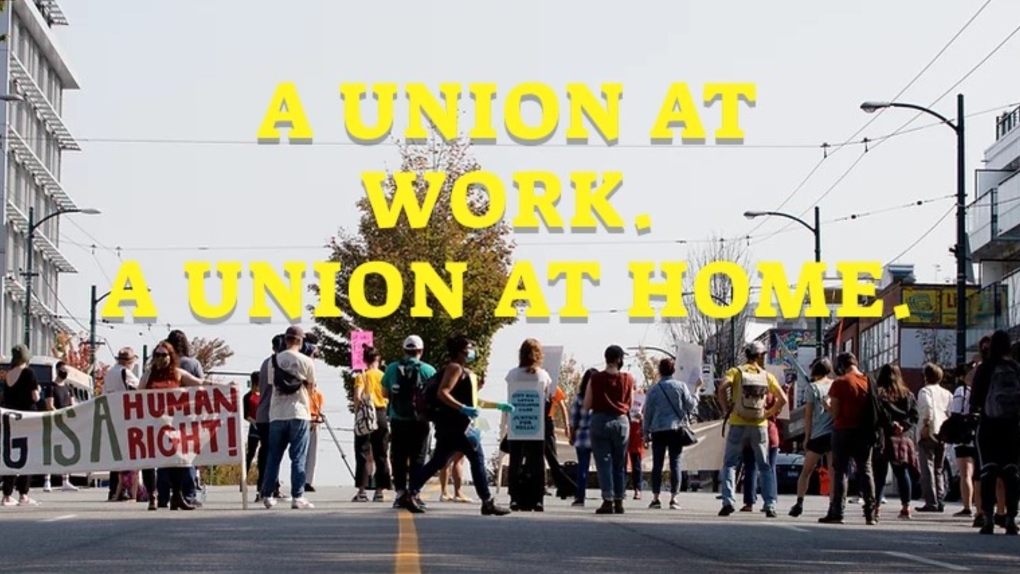Tenants push for collective bargaining rights as rents skyrocket, investors scoop up buildings
 (RentStrikeBargain.com)
(RentStrikeBargain.com)
Faced with skyrocketing rents and a growing number of investor landlords, tenant advocates are pushing the B.C. government for collective bargaining rights that would give them more power to negotiate with building owners.
While tenants' unions have existed in the province for decades, they've never secured the same legal recognition and protections as labour unions – but as more families face the possibility of being squeezed out of the market, the Rent Strike Bargain campaign believes the conditions are ripe for change.
"We want tenants to be able to get together and organize in their buildings and in their neighbourhoods and across cities – on whatever scale makes sense to them," campaigner Will Gladman told CTV News. "And beyond that, we want landlords to be compelled to meet with and to bargain with those tenant associations in good faith."
There's nothing stopping tenants from organizing now, but Gladman said official, government-recognized status would allow them to operate "without fear of reprisal" from building owners.
The campaigners' vision would see renters bargaining with landlords and signing agreements that could cap rent increases when tenants move out, or force owners to perform overdue repairs.
Landlords in British Columbia are already limited in how much they can increase the rent on occupied units – but once a tenant leaves, owners are free to charge "whatever the market can bear," Gladman noted.
Advocates blame that lack of regulation for staggering increases in rents over recent years. A report from Rentals.ca found new tenants in Vancouver were paying 23 per cent more in February 2022 than those who moved in just one year earlier.
PROGRESS SOUTH OF THE BORDER
While some may dismiss the Rent Strike Bargain campaign's goals as far-fetched, organizers point to San Francisco as proof that change is possible.
The city recently approved an ordinance forcing landlords to recognize tenants' rights and meet with renters' associations up to four times a year. If a landlord fails to do so, tenants can petition for a rent decrease.
"It's really exciting," Gladman said. "In San Francisco, obviously, they've achieved this on a municipal level, whereas we need to achieve it provincially. So there are going to be some differences in execution – but fundamentally, we're looking for the same thing."
Rent Strike Bargain has been in contact with David Eby, B.C.'s minister responsible for housing, but came away with the impression that his focus remains on "supply-side, market-based solutions" to the rental crisis.
Asked for comment Wednesday, Eby provided a statement to CTV News saying he appreciates the "insightful research the Rent Strike Bargain campaign has provided on these important issues."
The minister pointed to some of the renter protections the NDP has implemented since taking power five years ago, including closing the fixed-term lease loophole, which gave landlords an opportunity to raise rents beyond what was allowed under the Residential Tenancy Act.
"I’ve asked ministry staff to explore policy and legislative changes to further protect tenants. Helping renters continues to be a priority for this government," Eby added.
Gladman said the campaign isn't spending much energy lobbying the province – at least not yet.
For now, members are busy setting up tenants' unions across the province, including in Nelson, where a new union is celebrating its launch this weekend.
They are also building relationships with various labour unions. Rent Strike Bargain has already been endorsed by locals from the B.C. General Employees' Union, the Canadian Union of Public Employees, Unite Here, the Teaching Support Staff Union and the Vancouver Elementary School Teachers Association.
"There's a very energized labour movement in B.C. right now," Gladman said. "But all of the gains that the unions are able to achieve for their members, for their workers, are just being gobbled up by landlords immediately."
 A file photo shows Vancouver's skyline before the sun fully sets. (CTV/ Pete Cline)
A file photo shows Vancouver's skyline before the sun fully sets. (CTV/ Pete Cline)
INVESTORS BUYING RENTAL PROPERTIES
For advocates, the threat of rising rents shows no sign of subsiding in B.C. – particularly as real estate investment trusts, or REITs, continue to scoop up rental buildings.
Thom Armstrong, CEO of the Co-op Housing Federation of B.C., said those properties are seen as easy profit-generators for out-of-province REITs, whose aim, unlike some local mom-and-pop owners, is "the highest return on investment possible."
"That's incompatible with maintaining a supply of affordable, purpose-built rental housing," said Armstrong, who suggested those owners will do whatever they legally can to increase below-market rents.
"It's going to drive people who can't afford market rents – and who can these days? – either out of the market altogether or into homelessness."
Even though British Columbia has attempted to crack down on renovictions, by forcing property owners to apply to the Residential Tenancy Branch before jacking up rents, even after making significant repairs or improvements on a property, Armstrong believes there's still enough leeway in the legislation for REITs to flourish.
It's unclear how many rental buildings are owned by REITs, due to a lack of publicly available data, but Armstrong estimates they account for less than 10 per cent of the province's rental stock. He fears the proportion is growing quickly.
"It's a problem now. It's well on its way to becoming a crisis," he said.
The only reliable solution to out-of-control rent increases, according to the Co-op Housing Federation, is vacancy control – a system that ties rent to the unit, rather than the tenant.
LANDLORDS SAY THE SOLUTION IS SUPPLY
LandlordBC, whose members include everyone from building managers to investment property owners, declined to comment directly on the Rent Strike Bargain campaign on Wednesday, or on the influence of REITs on the market.
CEO David Hutniak told CTV News his organization has been working closely with the province's NDP government since 2017 to support a "legislative environment that's both fair and transparent" and serves renters and landlords alike.
Other renter protections introduced in recent years include increased penalties for landlords who evict tenants under false pretenses, and the launch of a Compliance and Enforcement Unit to investigate serious complaints against building owners.
Hutniak believes increasing the supply of rental housing remains the best solution to persistently low vacancy rates, which contribute to surging rents.
"At the end of the day, our members are focused on providing safe, secure, sustainable rental housing for British Columbians in an increasingly challenging environment due to exponentially increasing costs, many of them out of our control," Hutniak said in an email.
"That is our focus. We are at a very crucial point right now with interest rates rising and the impacts that will have on the operation and construction of rental housing."
CTVNews.ca Top Stories

Winter storms, wind and freezing rain: Hazardous conditions expected in some parts of Canada
Hazardous conditions are expected in some parts of Canada this week.
BoC expected to lower interest rates again, with odds leaning toward larger cut
Financial markets and forecasters are betting on another jumbo interest rate cut from the Bank of Canada this week.
The Canada Post strike involving more than 55,000 has hit 25 days
The Canada Post strike involving more than 55,000 workers has hit 25 days.
Police search for three men who escaped from immigration holding centre in Quebec
Authorities are searching for three Chilean nationals who escaped from the Laval Immigration Holding Centre north of Montreal.
Family spokesman says slain Edmonton security guard had only been working 3 days
A spokesman for the family of a security guard who police say was murdered while patrolling an Edmonton apartment building last week says the man had only been on the job for three days.
Celebrities spotted at Taylor Swift's final Eras Tour performance in Vancouver
Taylor Swift fans from around the world gathered in Vancouver on Sunday to witness the final performance of her massively popular Eras Tour, including a few celebrities.
Sask. hockey player recovering after near fatal skate accident during game
The Sask East Hockey League (SEHL) has released details of a near fatal accident at one of its games over the weekend – which saw a Churchbridge Imperials player suffer serious injuries after being struck with a skate.
Government faces third Tory non-confidence vote ahead of potential fiscal hurdle
The Liberals are set to face a third Conservative non-confidence vote today, but the government is likely to survive with the support of the NDP.
U.S. should be concerned about illegal immigration from Canada: Canadian survey
More than 80 per cent of Canadians believe the flow of illegal immigrants from Canada to the U.S. is a concern, according to a new survey.






























